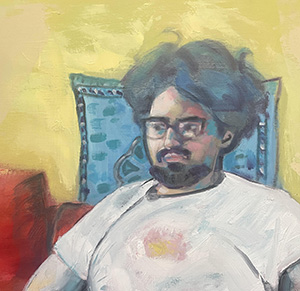Translingual Poetics:
Star Kashi interviews
Khashayar "Kess" Mohammadi

UVic work study student and Fiction Editorial Board intern Star Kashi talks with Khashayar "Kess" Mohammadi, one of two judges for our 2025 Long Poem Prize (accepting entries now with an Early Bird discount until December 31, 2024). They discuss introducing traditions, hyphenated identities, and speaking directly to the reader.
Khashayar “Kess” Mohammadi (They/Them) is a queer, Iranian born, Toronto-based poet, writer and translator. They were shortlisted for the 2021 Austin Clarke poetry prize, 2022’s Arc Poem of the Year award, The Malahat Review’s 2023 Open Season Poetry Award and The Fiddlehead’s 2024 Ralph Gustavson Award. They are the winner of the 2021 Vallum Poetry Prize and the author of four poetry chapbooks and three translated poetry chapbooks. They have released two full-length collections of poetry with Gordon Hill Press. Their full-length collaborative poetry manuscript G is out with Palimpsest press as of fall 2023, and their full-length collection of experimental dream-poems Daffod*ls is out with Pamenar Press. Their translation of Ghazal Mosadeq’s Andarzname is forthcoming with Ugly Duckling Presse Fall 2025. Their fifth poetry manuscript Book of Interruptions is forthcoming with Wolsak and Wynn fall 2025.
Poetry has always seemed boundless to me as it breaks the laws of literary traditions more than any other genre. You experiment with these boundaries in your book, G (Palimpsest, fall 2023), written in collaboration with Klara du Plessis (co-judge for the Long Poem Prize). What is your take on poetries that take a more orthodox or rather traditional route vs experimental poetry?
There are a few things to address here. Translingual poetics, of the likes of G, does not really break “traditional” poetry rules, rather it tries to introduce traditions to each other. “Experimental” poetry is always a subversion of the canon, and a canon is always created by political aims of a nation-state and the funds available to its arts sector to further its ethno-nationalist aims; therefore a “canon” is more often than not a colonial project. A “canon” against which experimental writing takes place is always within the borders of a state and its language(s). The importance of translingual poetics is not so much in breaking the poetic rules of one language, but to do away with the very deeply ingrained ideal that a poetics is dictated by a singular language (and its nation—although many nations share languages, their literatures follow different linguistic rules) and its symbolic system. Translingual poetics is a poetics that does not acquiesce to the very premise of “monolingual” writing and the proposed “nation” of its utopia. It considers the billions of people on this earth that live between language systems, either through hyphenated identities, immigration or living in cities where a half dozen or so languages are spoken daily. In the end, “traditional” and “experimental” poetry are mere labels for marketing and selling poetry, not for producing or consuming them.
What makes a poem stand out to you? What will you look for in Long Poem Prize entries?
I like a poem that speaks to me directly and not to a larger audience. Let me clear that up: Y’know when you’re listening to the radio and the host says “How are you doing on the 405 today? How’s your commute?” This is a broadcast going to tens of thousands of people, but the announcer doesn’t say “How is everybody on the 405?” because they realize that even though this is going out to tens of thousands, every single person listens to it alone. I want a poem to single me out and speak to me as if I’m its sole audience. I want a poem that can carry me through my rainy commute on the 405.
What would you say was the most challenging part of writing G for you? What’s your advice for writers who want to try collaboration for the first time?
I have never felt the slightest bit of challenge while writing. Writing is always a delight. I’ll mention something delightful about the experience though: while collaborating, it’s interesting to see how clear the voice becomes. Like I said above, often while writing, writers speak to this nebulous audience that eludes them somehow. When you collaborate, you know you’re speaking to one person who will read and has to understand you. So you magically begin speaking much clearer. It’s like the difference between writing an obituary for the paper, and writing a speech for the funeral. As soon as you realize “Oh damn! I’m gonna have to read all of these words in front of an entire audience,” your voice immediately clears up. If you don’t believe me go listen to any philosopher’s recorded lectures and see how much simpler their ideas become. Then compare it to their books. The fact that someone listens immediately really clears the throat y’know?
My greatest advice for people who want to collaborate is “Don’t push it. If it is hard, it may not be the right time.” I tried to collaborate with Klara five years ago. It didn’t work. Meanwhile four years ago, I reached out and in a matter of two months we wrote 80 pages.
In your poem “prosTHETIC,” you mention how an elder refused to accept the shared roots of your languages. Can you elaborate on this theme of shared linguistic roots through the lens of globalization?
I’d say my point isn’t so much “globalization” as it is history. I think “globalization” is a MUCH more contemporary phenomenon. For example, at the height of the Translation Movement in Syria, major Greek texts were being simultaneously translated into three separate semitic languages of Syriac, Hebrew and Arabic, which in the following few centuries made the Islamic world the epicentre of peripatetic philosophy and analysis. I doubt if any language (even Greek!) can surpass Arabic with the sheer amount of discourse on Aristotle. This means that terminology that shaped the elder roots of English, also inspired Persian. You have specifically named a passage where I was angry at someone for not accepting etymology and I’m not talking about that here anymore. There are connections within flows of culture that are much deeper than “globalization” really. At least older and much deeper ingrained. If an Indonesian teenager uses internet slang, that’s “globalization,” but what I find more fascinating is the prosthetic growth of language against itself throughout the centuries.
Your upcoming poetry book, Book of Interruptions (Wolsak and Wynn) is set for launch in fall 2025. Can you talk a bit about the main themes? Is there another project that you hope to work on after this one?
I spent the better part of this afternoon speaking to my editor about that book so this is coming at the best time! Book of Interruptions is an exploration of Perso-Islamic thoughtscapes through a contemporary, anti-colonial lens. I tried my best to rethink contemporary landscapes of West-Asia through the lens of libidinous philosophies. I’d like to think it’s my most “intellectual” endeavour, since it truly engages with a lot of source material.
I have so much more writing. I am working on so much. I’m currently excited about my new project solipCYST, which is a micropress I’ve started out of my bedroom where I publish single poems in hand-bound chaplets. The first two chaplets are by Montreal poet Jessi MacEachern and I’m super excited to send them out.
Aside from my translation of Ghazal Mosadeq’s Andarzname coming out with Ugly Duckling Presse in 2025, I also have enough material for more books already, but I think I’m just going to relax and see how life can carry me for now!

Star Kashi









